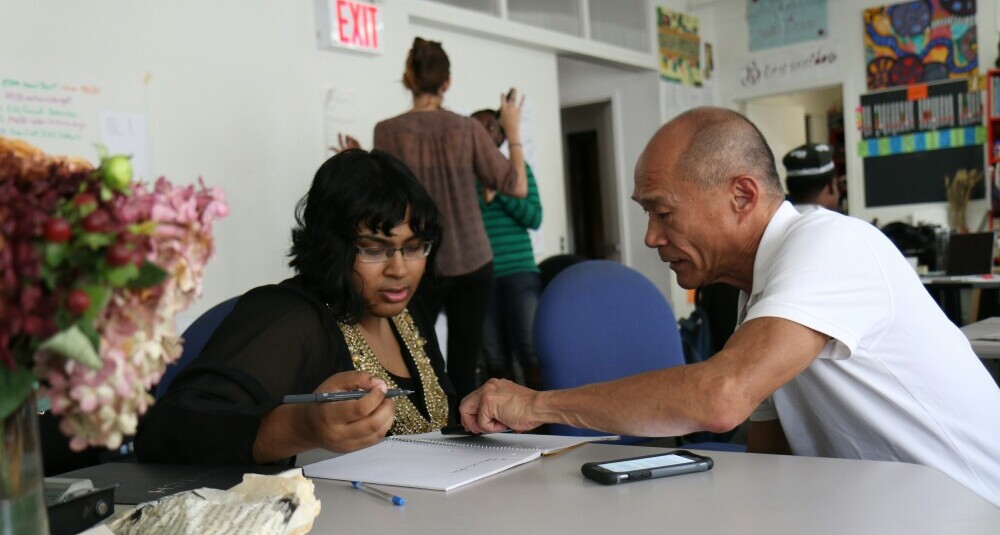If you have a passion for theatre and education, becoming a drama teacher in the UK can be a fulfilling career choice. In this guide, we will outline the key steps to becoming a drama teacher in a mainstream UK school, focusing on the qualifications and training required. If you are considering teaching in a private school, the requirements may vary, and gaining QTS (Qualified Teacher Status) may not always be mandatory. Many actors and theatre practitioners can also become drama teachers, either to supplement their own income or to fuel a passion to help others. Either way, read on to find out how to become a drama teacher in the UK.
What is QTS?
Qualified Teacher Status (QTS) is the accreditation that allows you to teach in most state schools in England. It is awarded after you have met the Teachers’ Standards, which set out the expectations for professional conduct, teaching ability, and subject knowledge. To achieve QTS, you typically complete a recognised teacher training programme, such as a Postgraduate Certificate in Education (PGCE) or School Direct training, followed by an induction period in a school. The standards assess areas like lesson planning, classroom management, and pupil progress to ensure that new teachers are fully prepared for the profession. The full Teachers’ Standards can be found on the UK government website: Teachers’ Standards (GOV.UK).
Educational Requirements
To teach drama in a mainstream UK school, you will typically need:
- GCSEs: A grade 4 (C) or above in English and Mathematics. If you plan to teach primary-level drama, you will also need a science GCSE at grade 4 or above too.
- Undergraduate Degree: A bachelor’s degree is essential. While having a degree in drama, performing arts, or theatre studies is beneficial, it is not always a requirement and you can often teach drama with other related degrees such as English, History or Psychology.

Routes into Teaching Drama
There are several routes into drama teaching, depending on your qualifications and experience. No one way is more suitable than any other as it will depend on your own circumstances, financial situation and the time you have to devote.
The main routes are:
1. Postgraduate Certificate in Education (PGCE)
This is a one-year full-time (or longer part-time) course that combines academic study with practical teaching experience. Many universities offer a PGCE in Drama, often in partnership with schools for hands-on training. To apply, you should go through the UCAS application process like any other university entrance. These courses usually have a set time in the university or college at the start of the course, and then students move into a school environment to do their teaching practice.
As part of this route, you will hopefully not only gain QTS, but will also pick up a post-graduate Level 7 qualification as well, which is the PGCE part.
2. School-Centred Initial Teacher Training (SCITT)
SCITT programs provide school-led training, often in collaboration with universities, and may also lead to a PGCE qualification. They offer a more immersive, hands-on experience in the classroom and you are usually in a school from day one. Students usually spend at least 1-2 days a week either in a college/university or in-house training within the SCITT. This may reduce over time as teaching practice takes over. The first half-term is usually spent observing lessons or teaching small parts rather than leading them, but eventually, you will need to take over and lead lessons independently.
3. Teach First
This program places high-achieving graduates into schools in low-income areas, allowing them to work as salaried trainee teachers while earning their QTS. Currently, most of these roles are in core subjects such as Maths, English and Science, but this may change in the future.
4. Apprenticeship
In the last few years, the UK has introduced a way of training to become a teacher via the apprenticeship route. This is similar to a route such as a B.Ed (Batchelor of Education) and takes four years but the benefit to many is that you can be paid as your learn instead of having to pay tuition fees. If you undertake a Teacher Degree Apprenticeship (TDA), you’ll work in a school part-time while studying for a bachelor’s degree at a university. By the end of the apprenticeship, you’ll earn a salary, a bachelor’s degree, and Qualified Teacher Status (QTS), allowing you to teach in England. Applications usually open in autumn, and you can apply via the Get Into Teaching website.
5. Subject Knowledge Enhancement (SKE) Courses
If your degree is not drama-related, you may need to complete an SKE course before starting teacher training to build the necessary subject expertise.

Assessment
If you are training to become a drama teacher in the UK, your assessment will be a combination of practical and theoretical elements. You will be expected to demonstrate your ability to plan and deliver engaging drama lessons, often through micro-teaching sessions with your peers or in real classroom settings. You will need to show that you are meeting the Teacher Standards and submit evidence to support this. This can be through a digital portal or a physical dossier.
Your tutors and mentors will observe your teaching, assessing your ability to manage a class, encourage creativity, and adapt to the different learning needs such as pupils with English as a Second Language (EAL) or those with special educational needs and disabilities (SEND).
Depending on the route you choose, you may also need to complete written assignments, such as essays on drama pedagogy, lesson plans, and reflective journals that evaluate your progress and understanding of educational theories.
Some courses may also require a research project or dissertation on a relevant topic. These assessments ensure you develop both the practical teaching skills and theoretical knowledge needed to become an effective drama teacher.
It is important to understand the assessment requirements of each course before you apply as some people thrive in academic environments and others prefer a more practical approach.
Gaining QTS through the Assessment Only Route
For experienced teachers or drama practitioners and actors wanting to move into drama teaching, this route can be an attractive route to QTS. However, you need to have been teaching in schools for at least two years to be eligible for the Assessment Only (AO) Route . This pathway allows candidates to gain QTS without undergoing further training, provided they can demonstrate they meet the Teachers’ Standards through an assessment process. This is particularly useful for unqualified teachers working in schools or overseas-trained teachers who want to qualify to teach in the UK.
To be eligible for the AO route, candidates must:
- Have a degree and GCSEs (or equivalent) in English and Maths (and Science for primary teaching).
- Have at least two years of relevant teaching experience.
- Be able to provide evidence that they meet the Teachers’ Standards through classroom practice.
This route typically takes a few months (3-6) and involves assessment visits from an accredited provider to verify the candidate’s teaching ability. To apply for this route, search “Assessment only QTS” to find universities and colleges which offer this.
Once you meet the Teachers’ Standards in England are awarded a QTS, you are qualified to teach in state-maintained schools in England.

Early Career Teacher (ECT) Induction Period
Once you have gained QTS, you must complete a two-year statutory induction period, during which you will receive structured support under the Early Career Framework (ECF). This replaces the previous one-year induction for Newly Qualified Teachers (NQTs).
As an Early Career Teacher (ECT), you will benefit from:
- A structured two-year training program based on the Early Career Framework.
- Support from a dedicated mentor.
- Time off timetable for induction activities, including training and mentor sessions. This is typically 10% off timetable in year 1 and 5% in year 2.
- Regular progress reviews and two formal assessments against the Teachers’ Standards.
These reforms aim to provide a stronger foundation for new teachers, ensuring they receive the necessary support in their early years in the profession.
SCITT Providers Across the UK
If you are considering a SCITT route, there are providers across the UK accredited to deliver initial teacher training leading to QTS. A full list of accredited providers can be found on the UK government’s website:
- List of SCITT Providers (England): Gov.uk Accredited ITT Providers
- Teach First Training Partners: Teach First SCITT Providers
Local SCITT Providers in Surrey
If you are considering a SCITT route, here are some providers in the Surrey area that offer secondary drama training:
- Surrey South Farnham SCITT
- Website: Surrey South Farnham SCITT
- Contact: scitt@sfet.org.uk | 01252 717408
- Xavier Teach SouthEast
- Website: Teach SouthEast
- Contact: 01932 578 682
- i2i Teaching Partnership SCITT
- Website: i2i Teaching Partnership

Funding and Financial Support
Training to be a teacher qualifies for various options in terms of financial support including:
- Tuition fee loans and maintenance loans to help with course costs and living expenses.
- Bursaries and scholarships, which may be available depending on your subject and academic background.
You can find out more about financial support for teacher training in the UK through the following resources:
- GOV.UK – Teacher Training Funding: This official government website provides detailed information on funding options for both undergraduate and postgraduate teacher training courses, including bursaries and scholarships.gov.uk
- Get Into Teaching: This website offers comprehensive guidance on the costs of teacher training courses, available funding, and practical support. It also provides information on bursaries, scholarships, and additional support for specific groups such as disabled individuals, parents, carers, and veterans.getintoteaching.education.gov.uk
- Department for Education (DfE): The DfE offers various bursaries and scholarships for postgraduate teacher training, depending on the subject you’re training to teach. You can find out if you’re eligible and how to apply on their website.getintoteaching.education.gov.uk
Private Schools and Alternative Routes
In private schools, the requirements for becoming a teacher may be different and they may place more emphasis on professional experience. Some schools do not require QTS and may hire teachers based on industry experience, professional acting qualifications, or alternative skills routes such as dance, singing or music qualifications. There is no standard for private and alternative schools. If you are interested in teaching in these institutions, the best thing to do is phone them and ask what their policy is.
Teaching in Wales, Scotland, and Northern Ireland
The process for becoming a drama teacher differs slightly in other parts of the UK:
- Wales: Teachers need to obtain Qualified Teacher Status (QTS) through an accredited Initial Teacher Education (ITE) programme. After training, new teachers complete the induction period under the Welsh Government’s system.
- Scotland: To teach in Scotland, you must obtain a teaching qualification accredited by the General Teaching Council for Scotland (GTCS), such as a PGDE (Postgraduate Diploma in Education). Scotland does not use QTS, and its teaching standards differ from England.
- Northern Ireland: Teachers must complete an Initial Teacher Education (ITE) programme and gain approval from the General Teaching Council for Northern Ireland (GTCNI). The induction period also differs from the English system.
If you are planning to teach outside of England, it is essential to check the specific requirements of the relevant teaching council.

Qualifications From Other Countries
If you are not a UK national but wish to teach in England, you may need to have your teaching qualifications recognised to gain Qualified Teacher Status (QTS). The process depends on where you trained.
From February 1, 2023, teachers from overseas countries can apply for QTS through a new streamlined process if they meet the eligibility criteria. This includes having a teaching qualification, relevant teaching experience, and meeting English language and safeguarding requirements. Teachers from countries such as the USA, Canada, Australia, New Zealand, India, Jamaica, Nigeria, South Africa, and others may be eligible for this route.
If your qualifications are not automatically recognised, you may need to complete an assessment-only QTS route, which allows experienced teachers to demonstrate their skills without further training. Alternatively, you may need to complete a teacher training course in England, such as a Postgraduate Certificate in Education (PGCE), to meet the required standards.
More details on international QTS recognition can be found on the UK government website:
Apply for QTS as a non-UK teacher (GOV.UK).
Final Thoughts
Teaching drama is a rewarding career that allows you to inspire creativity and confidence in students. Whether you pursue a university-led PGCE, a SCITT route, or an alternative pathway, there are many ways to become a qualified drama teacher in the UK.
For more details, visit Get Into Teaching, the official UK government site for prospective teachers.
To your success!
 ,
,

